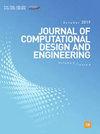Multi-strategy Remora Optimization Algorithm for solving multi-extremum problems
IF 6.1
2区 工程技术
Q1 COMPUTER SCIENCE, INTERDISCIPLINARY APPLICATIONS
引用次数: 1
Abstract
A metaheuristic algorithm that simulates the foraging behavior of remora has been proposed in recent years, called ROA. ROA mainly simulates host parasitism and host switching in the foraging behavior of remora. However, in the experiment, it was found that there is still room for improvement in the performance of ROA. When dealing with complex optimization problems, ROA often falls into local optimal solutions, and there is also the problem of too-slow convergence. Inspired by the natural rule of “Survival of the fittest ”, this paper proposes a random restart strategy to improve the ability of ROA to jump out of the local optimal solution. Secondly, inspired by the foraging behavior of remora, this paper adds an information entropy evaluation strategy and visual perception strategy based on ROA. With the blessing of three strategies, a multi-strategy Remora Optimization Algorithm (MSROA) is proposed. Through 23 benchmark functions and IEEE CEC2017 test functions, MSROA is comprehensively tested, and the experimental results show that MSROA has strong optimization capabilities. In order to further verify the application of MSROA in practice, this paper tests MSROA through five practical engineering problems, which proves that MSROA has strong competitiveness in solving practical optimization problems.求解多极值问题的多策略Remora优化算法
近年来,人们提出了一种模拟䲟鱼觅食行为的元启发式算法,称为ROA。ROA主要模拟了移蜂觅食行为中的寄主寄生和寄主切换。然而,在实验中,我们发现ROA的性能仍有提升的空间。在处理复杂的优化问题时,ROA常常陷入局部最优解,并且存在收敛过慢的问题。本文根据优胜劣汰的自然法则,提出随机重启策略,提高ROA跳出局部最优解的能力。其次,受䲟鱼觅食行为的启发,增加了基于ROA的信息熵评价策略和视觉感知策略;在三种策略的共同作用下,提出了一种多策略重构优化算法(MSROA)。通过23个基准函数和IEEE CEC2017测试函数,对MSROA进行了全面测试,实验结果表明MSROA具有较强的优化能力。为了进一步验证MSROA在实践中的应用,本文通过5个实际工程问题对MSROA进行了测试,证明MSROA在解决实际优化问题方面具有较强的竞争力。
本文章由计算机程序翻译,如有差异,请以英文原文为准。
求助全文
约1分钟内获得全文
求助全文
来源期刊

Journal of Computational Design and Engineering
Computer Science-Human-Computer Interaction
CiteScore
7.70
自引率
20.40%
发文量
125
期刊介绍:
Journal of Computational Design and Engineering is an international journal that aims to provide academia and industry with a venue for rapid publication of research papers reporting innovative computational methods and applications to achieve a major breakthrough, practical improvements, and bold new research directions within a wide range of design and engineering:
• Theory and its progress in computational advancement for design and engineering
• Development of computational framework to support large scale design and engineering
• Interaction issues among human, designed artifacts, and systems
• Knowledge-intensive technologies for intelligent and sustainable systems
• Emerging technology and convergence of technology fields presented with convincing design examples
• Educational issues for academia, practitioners, and future generation
• Proposal on new research directions as well as survey and retrospectives on mature field.
 求助内容:
求助内容: 应助结果提醒方式:
应助结果提醒方式:


